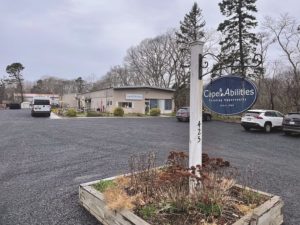EASTHAM — At a virtual meeting attended by more than 300 people on April 1, Cape Abilities CEO Kim McElholm announced that the nonprofit, which provides education, counseling, and employment support for people with disabilities, would be closing its Eastham location.
In a good year, seven full-time direct-support staff members work with 35 participants at the organization’s Cochran Center on Massasoit Road. Currently, there are only three people providing direct support, enough to serve just 11 participants.
The center will close its doors on June 30, McElholm said, after which participants can join a program in Hyannis.
The Cochran Center opened in Eastham in 1982, when Cape Abilities, then called Nauset Workshop, moved from Orleans, according to the organization’s website.
James Barnes, Cape Abilities vice president of philanthropy and engagement, said that the organization had looked for three years to find a new location closer to the mid-Cape where it might have better luck finding employees. “We’re not closing the door on a return to the area,” he said. “We just weren’t able to come up with a solution.
“For the people involved, it probably feels uncertain and scary,” Barnes noted. “Closing the facility is the last thing we want to do. This just gives us the best chance to get everybody back to program. It just wasn’t going to happen in Eastham.”

He added that the Hyannis facility, which Cape Abilities owns, was renovated just before the pandemic, whereas the organization has been renting from Cape Associates in Eastham.
The Center has been struggling to keep direct support staffing levels where they need to be for several years, said Barnes. “You don’t just need to have compassionate, caring staff anymore,” he explained. “You need to have compassionate and caring staff who also are okay making less money. And those days are over.”
Barnes said the organization began telling families at the end of March that the facility would be closing. About half of the program’s current participants live on the Eastham side of the rotary, so the added travel to Hyannis will be considerable. “That’s one of our biggest challenges right now,” Barnes said.
He said that, as far as he knows, those who had previously attended day habilitation programs at the Cochran Center are at home with their guardians. “Many of those individuals will still be on a waitlist while we staff up the Hyannis program,” Barnes said. “We still have staffing challenges in Hyannis as well, although nowhere near what we have in Eastham.”
Direct-support staff administer medication and are trained in CPR, first aid, and behavior modification techniques. At Cape Abilities they earn around $18 per hour, said Barnes. Although Cape Abilities seeks donations, the organization depends primarily on funding from the state’s Dept. of Developmental Services to cover direct-support staffing.
During the April 1 Zoom meeting, parents and the leaders of several nonprofit organizations, including the CEOs of Cape Abilities, the Latham Centers, Living Independently Forever (LIFE), and Community Connections, pleaded with state legislators to raise the state’s contribution to direct-support staff wages to $20 per hour.
Michael Morea, who spoke at the meeting, said that he has worked in human services for 18 years and that when the pandemic began he had to work as many as 80 hours per week to cover vacancies at Latham.
He had been a manager, he said, but opted a year ago to work in a direct-care role, hoping it would give him more time with his family.
“It didn’t take but five months in a direct-care position,” Morea said, to learn that “I couldn’t afford it.” Morea ultimately took a job as an assistant manager in a new Latham facility and made up part of his lost earnings, but, he said, “I was lucky. If you can’t afford to do a job you love because of the money, it hurts. It’s hard.”
State Rep. Sarah Peake of Provincetown and state Sen. Julian Cyr of Truro were present at the meeting. They said they strongly supported raising the state contribution to direct-support staff wages.
“I’m in full support of your budget ask,” said Peake, who has a powerful position in the House leadership. “I’ve identified it with the ways and means chairman.”
“I, too, don’t need to be convinced on this issue,” said Cyr. “We’re going to go to the mat for you on Beacon Hill. This is a priority for us.”
Both legislators encouraged the attendees to share their stories and petition their town governments to create more affordable housing.
But Barnes said he doubts that raising the state contribution to $20 per hour would solve the problem. “If we’re being realistic, $20 an hour on Cape Cod is not a living wage either,” he said, though he admitted it would be a start.
“Cape Abilities has a vocational support specialist who goes out into the community and tries to find jobs for people with disabilities, develops relationships with employers in the community, and once that person is placed into a job, checks up on them to help them integrate into a diverse and competitive work environment,” Barnes said. “Many times, our employee is placing the client in a job that pays more than what they make.
“I can’t think of a better example of what’s wrong right now,” Barnes added. “You have these people doing such important work in our community, and they could go work at Target or Chick-fil-A and make more money.”



